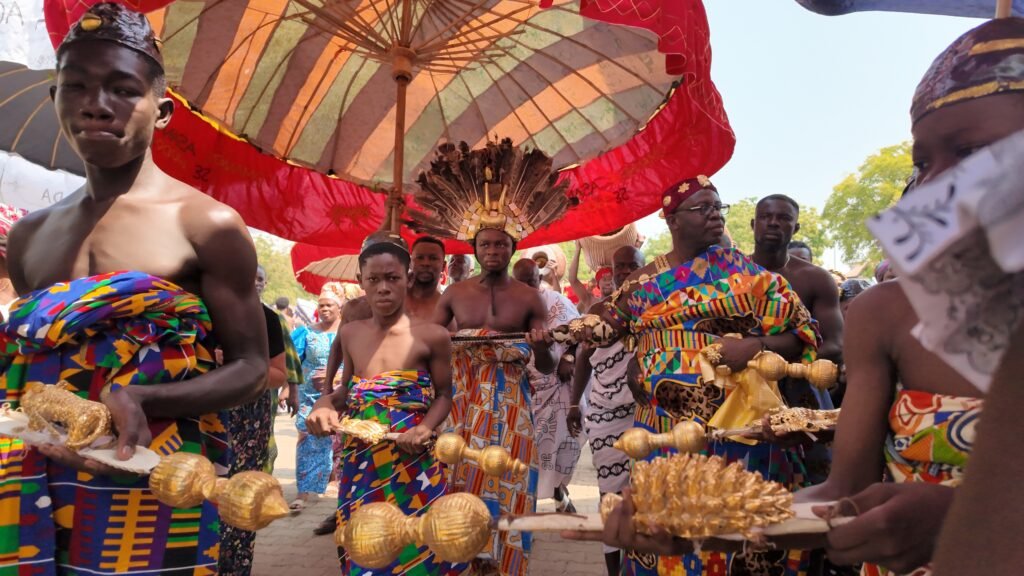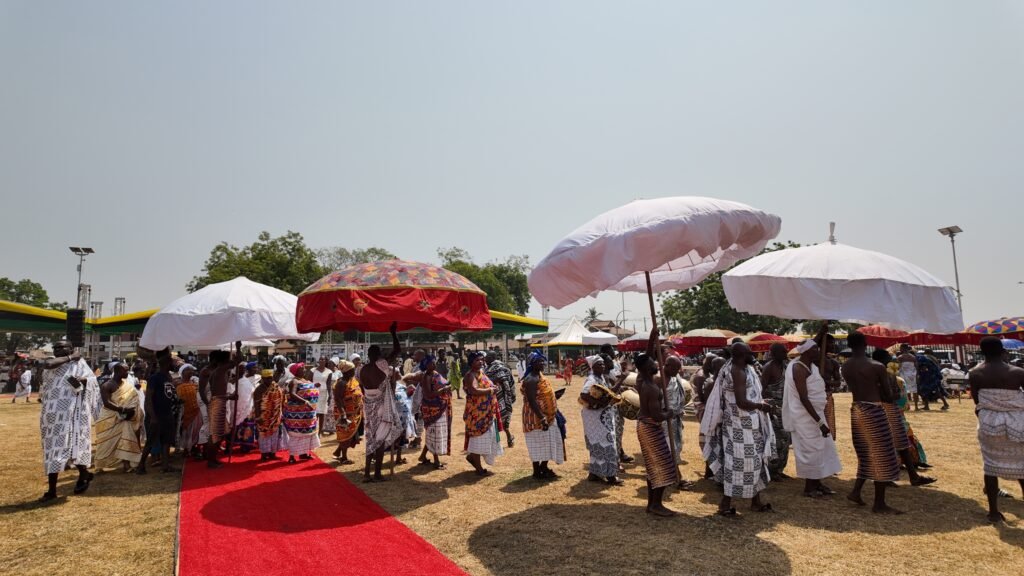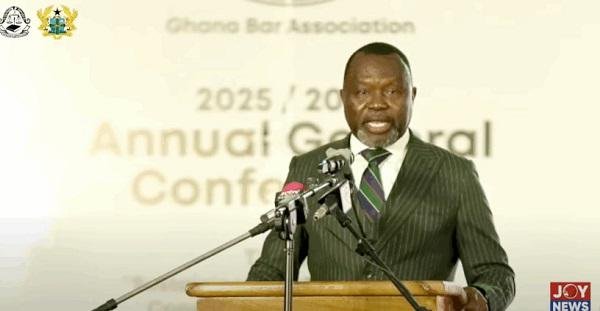News
Akwasidae: The rich cultural pageantry of the Ashanti Kingdom

The rhythmic sounds of the fontomfrom drums echoed through the skies, announcing the arrival of the highly anticipated Akwasidae celebration. Held every six weeks, this cultural extravaganza is not just a festival; it is a regal display of the Ashanti Kingdom’s heritage, an embodiment of unity, and a moment to honour its proud lineage.
This year’s Akwasidae, held at the iconic Manhyia Palace in Kumasi, was a spectacle of grandeur. The sprawling courtyard was adorned with the colourful kente cloths of attendees, their intricate patterns shimmering in the sunlight. Chiefs and queen mothers arrived with their entourage with each chief’s regalia a dazzling reflection of power and tradition.


Appellations by court criers heralds the arrival of the Asantehene through formal announcements, ensuring the crowd remains attentive and also declarations, royal messages, blessings, and reminders about the cultural significance of the festival, reinforcing its importance to the Ashanti heritage.
The Asantehene, Otumfuo Osei Tutu II, the custodian of Ashanti culture, would finally sit majestically on the Golden Stool. He is draped in a vibrant kente cloth and crowned with gold ornaments, symbolised the continuity of a kingdom that has stood tall for centuries.
As he received homage from subjects, chiefs, and dignitaries, the crowd erupted in cheers, a testament to the deep reverence for their monarch.



The celebration was a mix of solemnity and jubilation. The Akom priests led prayers and libations, invoking the spirits of ancestors and asking for guidance and blessings. The rituals were punctuated by the enthralling performances of traditional drummers, dancers, and singers who narrated the kingdom’s history through music and movement.
Visitors from across the world flocked to Kumasi to witness this extraordinary event. “The energy here is electric,” remarked a tourist from Germany. “It’s not just a festival; it’s a living history lesson.”
Akwasidae is more than just a cultural celebration; it is also an occasion for reconciliation and unity. Families, separated by distance or disputes, use this sacred day to mend bonds and strengthen ties. Communities gather to deliberate on development issues, ensuring progress while remaining anchored in their heritage.
The festival is also a boon for tourism and commerce, where local artisans displayed their craftsmanship, beads, carvings, pottery, and textiles—while food vendors offered traditional delicacies like fufu with light soup, apapransa and a special traditional khebab.
As the sun set over Manhyia, the festivities showed no signs of waning. The drummers’ beats grew livelier, the dances more animated, and the crowd more jubilant. It was an emotional reminder that Akwasidae is not just a date on a calendar but a celebration of identity, resilience, and the unbreakable spirit of the Ashanti people.
Indeed, Akwasidae remains a shining example of Ghana’s cultural wealth and a proud beacon of African heritage. Whether you’re an Ashanti royal, a curious traveller, or simply an admirer of tradition, this festival offers an unforgettable experience that lingers in the heart long after the last drumbeat fades.
News
Declare a state of emergency in parts of the country affected by illegal mining – Coalition Against Galamsey to Mahama

The Coalition Against Galamsey is asking President John Mahama to declare a state of emergency in areas badly affected by illegal mining.
According to the Convenor of the Coalition, Dr. Kenneth Ashigbey, the situation has gone beyond control and requires urgent action to save lives and protect the environment.
He explained that the Constitution allows a state of emergency to be declared when the actions of criminals threaten essential resources such as water, safety, and the survival of communities.
He said illegal miners were destroying water bodies and depriving large communities of clean drinking water, which is an “essential of life.”
Dr. Ashigbey stressed that the call was not for the entire country, but only for parts of Ghana where the destruction is severe.
He added that declaring a state of emergency in these areas will give government the legal power to act quickly and decisively.
He also called on the President to provide clear timelines and targets to guide the fight against galamsey.
This, he said, would help demonstrate government’s seriousness and commitment to ending the menace.
The Coalition insisted that declaring a state of emergency was no longer a last resort but an immediate step needed to save Ghanaians and protect the future of the country.
By: Jacob Aggrey
News
The Ghana Bar Association must be non-partisan in the discharge of their duties – Dominic Ayine urges

The Attorney General and Minister for Justice, Dominic Ayine, has called on the Ghana Bar Association (GBA) to remain non-partisan in the discharge of its duties.
He said the credibility of the legal profession would be at risk if the bar allowed itself to be influenced by political interests.
Speaking at the GBA 2025/ 2026 annual general conference, Dr. Ayine reminded members that their first allegiance was to the Constitution and the Republic, not to any government or opposition party.
He stressed that for over three decades, the GBA had played an important role in helping the Supreme Court interpret and enforce the law, but outside the courtroom, its advocacy had often lacked consistency.
Dr. Ayine pointed to past cases such as the 2015 petition against the former CHRAJ Chairperson, Loretta Lamptey, and the 2017 petition for the removal of Electoral Commission Chairperson, Charlotte Osei, where the bar remained silent.
He noted that the association only found its voice during the petition against former Chief Justice Gertrude Torkornoo, a stance he said coincided with the position of the opposition.
He questioned why the bar acted differently in those situations, especially since all three cases involved women of repute who held positions in key constitutional bodies.
Dr. Ayine urged the GBA to be the conscience of the republic, saying lawyers must defend the rule of law, the independence of the judiciary, and the rights of citizens regardless of which political party was in power.
He warned against inviting foreign interference in Ghana’s constitutional matters, saying international collaboration should be limited to professional exchanges and not politics.
He further encouraged the GBA to promote integrity among its members, strengthen pro bono services to support the poor, and embrace digital reforms such as e-filing and electronic court records to modernize the justice system.
According to him, the destiny of Ghana is tied to the integrity of the legal profession.
He added that if lawyers stand firm, the country will also stand firm, but if they falter, the republic will stumble.
By: Jacob Aggrey














